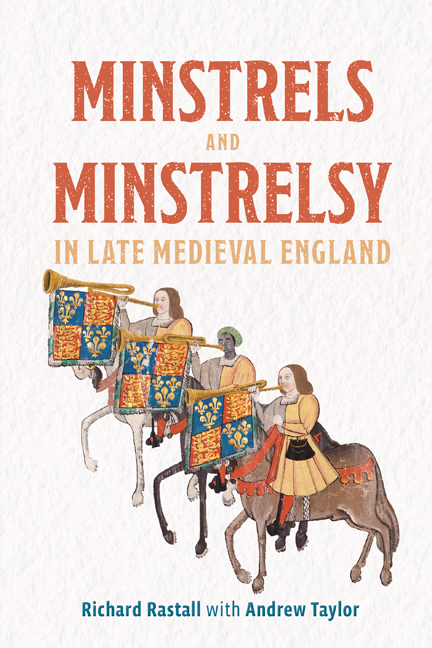Book contents
- Frontmatter
- Dedication
- Contents
- List of illustrations
- List of music examples
- List of abbreviations
- A note on references
- A note on money
- A note on dates
- Preface
- Acknowledgments
- Part I Minstrels and Minstrelsy in the Elite Households
- Part II Urban Minstrelsy
- Part III On the Road
- Part IV Minstrel Performance
- Envoi
- Bibliography
- Index
15 - The instrumental repertory in England
Published online by Cambridge University Press: 09 January 2024
- Frontmatter
- Dedication
- Contents
- List of illustrations
- List of music examples
- List of abbreviations
- A note on references
- A note on money
- A note on dates
- Preface
- Acknowledgments
- Part I Minstrels and Minstrelsy in the Elite Households
- Part II Urban Minstrelsy
- Part III On the Road
- Part IV Minstrel Performance
- Envoi
- Bibliography
- Index
Summary
In 1958, Frank Harrison noted that
[Pre-Tudor] examples of secular music are few and of minor importance, and I have not dealt with them here. Nothing identifiable as minstrel music has survived, and the history of minstrelsy belongs to the study of social life and customs rather than of actual music. The history of musical instruments other than the organ is in much the same case, for there is no evidence that any instruments but the organ were normally played in church, and the musical remains are restricted to a small group of instrumental dances.
Thus secular music was dismissed from the authoritative work on music in medieval Britain. One can hardly blame Harrison, for surviving examples of medieval English secular music are not only few in number, but so enigmatic that the precise problems are elusive, let alone the solutions. Some intriguing questions are raised by his remarks, nevertheless. It may be true that ‘nothing identifiable as minstrel music has survived’, but it is also true that we should probably not recognise a piece of minstrel music if we saw it. For this reason the surviving examples of secular music, few and enigmatic as they are, become of prime importance to any study of minstrelsy. Could any of these survivals be minstrels’ music? – and, if so, could the minstrels have read the written music or performed from it?
Harrison also restricted himself to English sources, a pragmatic if rather limiting decision. At the time he wrote, it was sensible not to rely on continental evidence, because it was by no means clear that such evidence would be relevant to English music. Sixty years on, it is certain that the British Isles were not culturally isolated from the continent of Europe, and that minstrel practices in England and Scotland were likely to be influenced by those in continental Europe. There were opportunities for exchange of information during the visits of continental nobles to the English Court, and in the travels of the English abroad. As we have seen, some foreign minstrels remained in Court for weeks or even months at a time, and we should expect them to share their repertories and methods with their English colleagues, and vice versa. That was, after all, the purpose of the minstrel schools, to which English minstrels travelled.
- Type
- Chapter
- Information
- Minstrels and Minstrelsy in Late Medieval England , pp. 362 - 394Publisher: Boydell & BrewerPrint publication year: 2023



